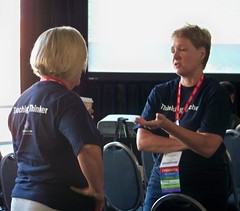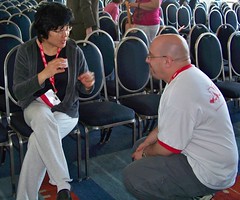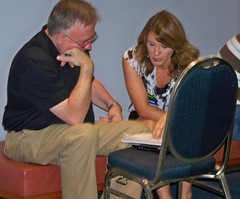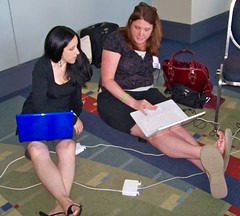EdubloggerCon 2009 Reflections

Last year I was pretty critical of EduBloggerCon. For me it was too big, too scripted, and...well...you can read the post.
This year....smaller, deeper, and more thoughtful. Exactly what I was hoping for and personally what I need to push my own thinking. It was one of those days where you went to one but watch others via Twitter. You wanted to go to all the sessions...and in some ways you did via the conversations that happened between the actual sessions.
Last year I said it was too big...around 250 people. This year around 75 people....not a bad size.
 Last year it was to scripted....this year it was flexible, adaptable, and conversation based. Not adaptable enough for my taste but that was due more to the people that went than the organization of the sessions.
Last year it was to scripted....this year it was flexible, adaptable, and conversation based. Not adaptable enough for my taste but that was due more to the people that went than the organization of the sessions.
With empty sessions all over the wiki, nobody should complain that the conversation wasn't what they needed. If you wanted a conversation the spots were available to put up a topic. I did just that wanting to discuss the changes that are happening with blogging because of Twitter and this whole "live stream" service (more on that later).
So....here are my take aways from EduBloggerCon 2009
 Best Practice of PD (My live notes)
Best Practice of PD (My live notes)
A great session that had a group of about 30 break into smaller groups, discuss ideas on what worked at our schools and then came back together to share as a group. We came to the same conclusions that it seems we always end up at:
- Getting administrators on board is key
- You have to meet teacher where they are
- There are different approaches, no one right model/way to shift teachers
- Change is hard
- Change is frustrating
Build Your Own Tool (My notes)
A great session that allowed us all to dream about the tool we would create if we had a coder. That's exactly what Mark Wagner wanted out of the session and has had success with when he rents a coder to create applications for him.
Where School Reform Meets Madonna:
This session was too deep for me to even take notes on....I was too busy thinking about the conversation that was going on. It was a great intense hour with one liners that filled twitter faster than any single one person could type.
 My take away....or just good reminder...came from Scott McLeod when he reminded me that kids that are 14,15,16 years old are all about ME. How do we tap into that ME and make the world relevant to them? It's where they are developmentally and it's not a bad thing. These kids are trying to find out who they are, where do they fit, and the web and their web presence is a part of that. How do we tap into that ME, find what is passionate to them, and then find them an audience that makes learning relevant? It's good to be reminded just where these kids are at. We talked about that they don't use Twitter or blog because that is about spreading your message and not about ME. ME is about ME and my friends, it's exactly what Facebook offers them...a place to hang out with their friends, talk with their friends, and be with their friends. Can we tap into this? Can we use this to our advantage? How do we use this in a learning enviornment? Should we?
My take away....or just good reminder...came from Scott McLeod when he reminded me that kids that are 14,15,16 years old are all about ME. How do we tap into that ME and make the world relevant to them? It's where they are developmentally and it's not a bad thing. These kids are trying to find out who they are, where do they fit, and the web and their web presence is a part of that. How do we tap into that ME, find what is passionate to them, and then find them an audience that makes learning relevant? It's good to be reminded just where these kids are at. We talked about that they don't use Twitter or blog because that is about spreading your message and not about ME. ME is about ME and my friends, it's exactly what Facebook offers them...a place to hang out with their friends, talk with their friends, and be with their friends. Can we tap into this? Can we use this to our advantage? How do we use this in a learning enviornment? Should we?
Edu Blogging:
Lastly was a discussion I lead on where is EduBlogging heading and/or is it dead already?
 It was a good discussion that talked about how the conversation is changing. That at a point in time we use to actually take time to read and leave comments on blog posts. Now we read, and retweet blog posts. We talked about how Twitter is the new aggregator and is replacing RSS as a way people are getting their information. On this blog for example, I have more readers that come via Twitter then I do via the RSS feed.
It was a good discussion that talked about how the conversation is changing. That at a point in time we use to actually take time to read and leave comments on blog posts. Now we read, and retweet blog posts. We talked about how Twitter is the new aggregator and is replacing RSS as a way people are getting their information. On this blog for example, I have more readers that come via Twitter then I do via the RSS feed.
Because of Twitters live constant scrolling feed, we also talked about how the "life span" of a blog post is shrinking. I use to get comments on a blog post lasting weeks. Now I post a blog, it gets a comment or maybe two in a the first 10 minutes, gets retweeted for about 20 minutes and then it's old news. I've also been running tests about the timing of blog posts. Being in Thailand I found that blog posts that I posted on my lunch hour had fewer views then those that got posted late at night. I have a theory this has to do with time zones as most educational twitters are in North America. So I've set different blog posts to go live at different times and have found that I get more readers on a blog post if it is posted around 3pm EST. This is a great time to release a blog post as educators on the east coast are just getting out of school and checking Twitter, while educators on the west coast are checking Twitter over lunch. Depending on the blog post I can see views fluctuate by the 100s.
 Now...please do not think that I'm all about the number of readers. It's just an experiment that I've been running (and seeing I'm posting this at 11pm EST we'll see how it goes) to see if the "life span" of blog posts are getting shorter...so far....I think they are.
Now...please do not think that I'm all about the number of readers. It's just an experiment that I've been running (and seeing I'm posting this at 11pm EST we'll see how it goes) to see if the "life span" of blog posts are getting shorter...so far....I think they are.
We then talked about our students blogging and what is the reason for it. David Warlick brought us back from a rant at one point to focus on that all of this, whether blogging, or twitter, or facebook updates, it's all about conversations and communication. Yes, the conversations are changing. But in the end we're just communicating with different tools. Whether it's paint drawings on walls in a cave or quick 140 character Twitter messages. We have an internal need to communicate and that's the fundamental skill we need to be teaching students.
So those are my "official" take aways from today. Of course all of these conversations have been had before, and could have been had on the web. The real reason I'm here are for all the conversations that can't be had via the web. It's shaking hands, giving hugs, and just catching up. It's the quick conversation over lunch or over a drink. It's the time together with people that is the reason we all decend on Washington DC. I look forward to the rest of the conference and just being with other educational technologists.
Technorati Tags: EBC09, EBC, NECC09, NECC, Twitter, Facebook, Blogging
